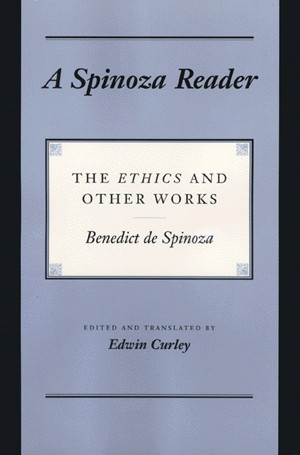Benedict de Spinoza: A Spinoza Reader: The Ethics and Other Works (1994)
Filed under book | Tags: · ethics, philosophy, religion, science

“This anthology of the work of Baruch de Spinoza (1632-1677) presents the text of Spinoza’s masterwork, the Ethics, in what is now the standard translation by Edwin Curley. Also included are selections from other works by Spinoza, chosen by Curley to make the Ethics easier to understand, and a substantial introduction that gives an overview of Spinoza’s life and the main themes of his philosophy. Perfect for course use, the Spinoza Reader is a practical tool with which to approach one of the world’s greatest but most difficult thinkers, a passionate seeker of the truth who has been viewed by some as an atheist and by others as a religious mystic.
The anthology begins with the opening section of the Treatise on the Emendation of the Intellect, which has always moved readers by its description of the young Spinoza’s spiritual quest, his dissatisfaction with the things people ordinarily strive for–wealth, honor, and sensual pleasure–and his hope that the pursuit of knowledge would lead him to discover the true good. The emphasis throughout these selections is on metaphysical, epistemological, and religious issues: the existence and nature of God, his relation to the world, the nature of the human mind and its relation to the body, and the theory of demonstration, axioms, and definitions. For each of these topics, the editor supplements the rigorous discussions in the Ethics with informal treatments from Spinoza’s other works.”
Edited and translated by Edwin M. Curley
Publisher Princeton University Press, 1994
ISBN 0691000670, 9780691000671
280 pages
PDF (11 MB, updated on 2021-6-23)
Comments (2)Manuel DeLanda: Deleuze: History and Science (2010)
Filed under book | Tags: · assemblage, history, metaphysics, ontology, philosophy, philosophy of history, philosophy of science, science

This is a collection of essays, most published here for the first time, on Gilles Deleuze’s ideas about history and science. Its focus is on ontological or metaphysical questions: What are the legitimate social entities that can be used in historical explanations, given a materialist metaphysics? What are the legitimate inhabitants of the material world, natural and artificial, and what role should science play in determining their legitimacy? What can philosophy contribute to this enterprise?
Editor: Wolfgang Schirmacher
Publisher Atropos Press, 2010
ISBN 0982706715, 9780982706718
168 pages
PDF (updated on 2012-7-17)
Comment (0)Jean-François Lyotard: The Postmodern Condition: A Report on Knowledge (1979–) [IT, EN, BR-PT, CZ, GR, LV, CR]
Filed under book | Tags: · epistemology, grand narratives, knowledge, machine, mass media, philosophy, postmodern, postmodernism, science, technology

“The Postmodern Condition: A Report on Knowledge is a short but influential philosophy book by Jean-François Lyotard in which he analyzes the epistemology of postmodern culture as the end of ‘grand narratives’ or metanarratives, which he considers a quintessential feature of modernity. The book was originally written as a report to the Conseil des universités du Québec. The book introduced the term ‘postmodernism’, which was previously only used by art critics, in philosophy with the following quotation: “Simplifying to the extreme, I define postmodern as incredulity towards metanarratives”.
Among the metanarratives are reductionism and teleological notions of human history such as those of the Enlightenment and Marxism. These have become untenable, according to Lyotard, by technological progress in the areas of communication, mass media and computer science. Techniques such as artificial intelligence and machine translation show a shift to linguistic and symbolic production as central elements of the postindustrial economy and the related postmodern culture, which had risen at the end of the 1950s after the reconstruction of western Europe. The result is a plurality of language-games (a term coined by Wittgenstein), without any overarching structure. Modern science thus destroys its own metanarrative.
In the book, Lyotard professes a preference for this plurality of small narratives that compete with each other, replacing the totalitarianism of grand narratives. For this reason, The Postmodern Condidtion has been criticized as an excuse for unbounded relativism. However, Lyotard suggests that there is an objective truth, but because of the limited amount of knowledge that humans can understand, humans will never know this objective truth. In other words, Lyotard advocates that there is no certainty of ideas, but rather there are better or worse ways to interpret things.
The Postmodern Condition was written as a report on the influence of technology on the notion of knowledge in exact sciences, commissioned by the Québec government. Lyotard later admitted that he had a ‘less than limited’ knowledge of the science he was to write about, and to compensate for this knowledge, he ‘made stories up’ and referred to a number of books that he hadn’t actually read. In retrospect, he called it ‘a parody’ and ‘simply the worst of all my books’. Despite this, and much to Lyotard’s regret, it came to be seen as his most important piece of writing.”
First published as the report Les problèmes du savoir dans les sociétés industrielles les plus développées, 1979; consequently as La Condition postmoderne: rapport sur le savoir, Les Editions de Minuit, Paris, 1979.
English edition
Translated by Geoff Bennington and Brian Massumi
Foreword by Fredric Jameson
Publisher University of Minnesota Press, 1984
Theory and History of Literature series, Volume 10
ISBN 0719014506
135 pages
La condizione postmoderna (Italian, trans. Carlo Formenti, 1981/2014, 5 MB, added on 2015-5-4)
The Postmodern Condition (English, trans. Geoff Bennington & Brian Massumi, 1984, updated on 2012-7-24)
O pós-moderno (Brazilian Portuguese, trans. Ricardo Correa Barbosa, 1986/1988, 8 MB, added on 2015-5-4)
O postmodernismu (Czech, trans. Jiří Pechar, 1993, added on 2015-5-4)
Η μεταμοντέρνα κατάσταση (Greek, trans. Κωστής Παπαγιώργης, 1993, added on 2015-5-4)
Postmodernus būvis (Lithuanian, trans. Marius Daškus, 1993, 4 MB, added on 2015-5-4)
Postmoderno stanje: izvještaj o znanju (Croatian, trans. Tatiana Tadić, 2005, added on 2017-7-27)

